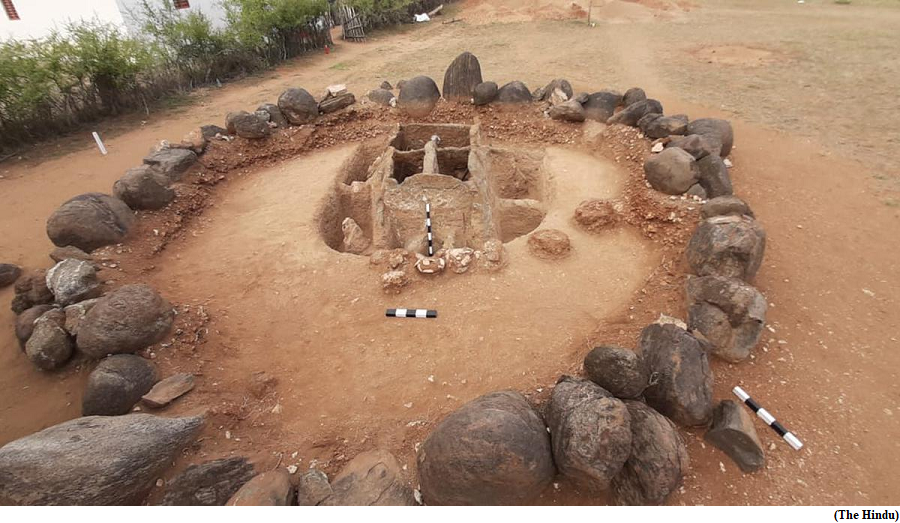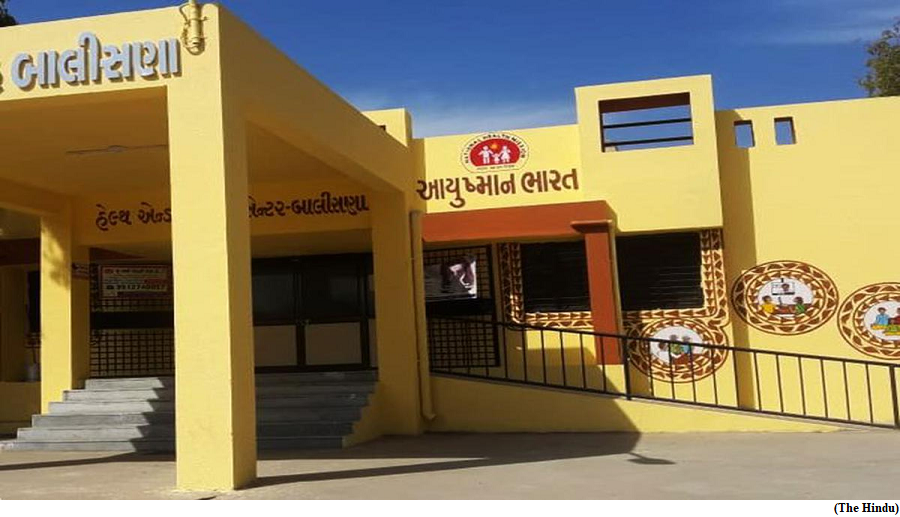Archaeologists come up with rare findings in Tamil Nadu (GS Paper 1, Culture)

Why in news?
- Recently, a gold stud, a bone point and a carnelian bead have been unearthed by archaeologists at Porpanaikottai in Pudukottai district of Tamil Nadu.
- A Sangam-age fort is believed to have existed at the site.
Key excavations:
- The stud in floral design with six petals was found at a depth of 133 cm in one of the eight trenches dug at the site. The ornament, weighing 0.26 grams, was probably used as a nose stud and is an indication of the culture of the Sangam Age.
- The bone point and the broken piece of carnelian bead were found at a depth of 140-160 cm in another trench. The bone point, with pointed ends on both sides and carvings, was probably used for weaving.
- The discovery of the red round-shaped carnelian bead is a pointer to domestic trade. Carnelian beads have been found at Kodumanal and a few other places in Tamil Nadu. The stones were usually sourced from Gujarat.
- A three-course brick structure was unearthed within a few days of digging.
- Over 150 antiques, including potsherds, hopscotches, spouts, pieces of glass bangles and beads, a terracotta lamp, a coin, a spindle whorl and rubbing stone, besides a couple of graffiti, have been found at the site so far.
Habitations:
- Porpanaikottai, situated about 6.5 km to the east of Pudukottai town, is one of the new sites where the department had taken up excavation in 2023.
- Studies carried out at the site using Light Detection and Ranging (LIDAR), a remote sensing method, had indicated that a fort had existed at Porpanaikottai.
- A habitation mound spread over 1.26 hectares is believed to have existed within the fort. The excavation is currently focussed on this area.
- Eight trenches, six of them in the properties owned by three persons, are being dug currently.
Centre adding more services to Ayushman Bharat health centres
(GS Paper 2, Health)
Why in news?
- The Union Health Ministry is expanding Ayushman Bharat-Health and Wellness Centres and the aim is to cover all the centres by August-end.

Details:
- The Ayushman Bharat-Health and Wellness Centres (AB-HWCs) programme, which has grown to more than 1.6 lakh centres and registered over 178.87 crore beneficiaries (as of June-end) in the five years since its inception, is undergoing its biggest expansion of services.
- The Union government is adding services such as screening, prevention, control and management of non-communicable diseases, care for common ophthalmic and ENT problems, basic oral health care, elderly and palliative health care services, emergency medical services and screening and management of mental health ailments.
Upgraded services:
- To complement the expanded services, the essential list of medicines and diagnostics has been expanded to make available 171 medicines at primary health care-health and wellness centres and 105 at the secondary centres. A total of 63 and 14 diagnostics will be added respectively.
- A new cadre of community health officers, with 1.29 lakh in position, has been introduced at the secondary centres to act as clinicians and public health managers and to lead the team of Accredited Social Health Activists, anganwadi workers and auxiliary nurse midwives.
- The centres were being encouraged to undergo the National Quality Assurance Standards assessment and certification with a target of 50% by 2026.
About AB-HWCs:
- The programme, started in 2018, is aimed at bringing in promotive, preventive, curative, palliative and rehabilitative aspects of universal health coverage.
- The goal is to provide comprehensive primary health care (CPHC), including both maternal and child health services and non-communicable diseases as well as free essential drugs and diagnostic services through AB-HWCs closer to the homes of people.
- CPHC and wellness package activities at AB-HWC include yoga, Zumba, meditation, counselling for healthy diet and lifestyle, marathons, cyclothons and celebration of annual health days. More than 2.16-crore wellness sessions have been conducted with participation of 23.83-crore individuals.



